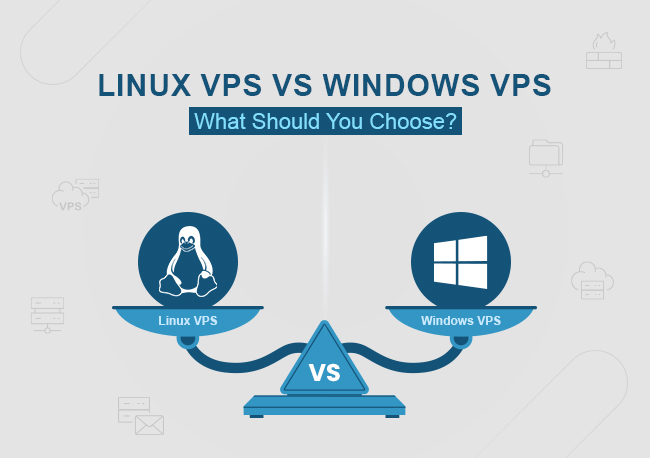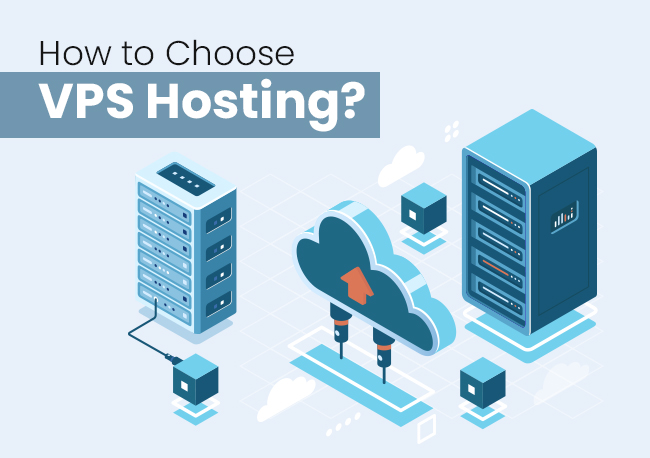While choosing the web hosting for your website, you have three choices: Dedicated server, Virtual Private Server, or Shared Hosting. While a Dedicated server can be the most secure, it is not very economical; the first problem you’ll be facing is maintaining it yourself or assigning someone for that, so you see, if you have to appoint someone to maintain something, it is not cheap.
Another option is choosing shared hosting; while it is the most affordable option, it is not secure enough. If you are starting with your first website and just looking to gain some experience in the field, then shared hosting can be your ideal choice, but remember, shared hosting is the most vulnerable hosting and an easy target for data thieves.
Virtual Private Server, or VPS hosting, comes in between the two. It gives you most of the functionality of a dedicated server without any of the worries. In VPS, dedicated storage, RAM, and CPU resources are segmented in a virtualized server environment. The virtual servers provide more stable and scalable web hosting. They are more secure and use fewer resources, making them the best option for a mid-sized business or organization.
Windows and Linux are two of the most popular operating systems and power over 60% of all websites on the internet. You have two options in VPS hosting to choose from; Windows VPS or Linux VPS. Both Operating Systems have their features and benefits. Which is better for you between these two completely depends on the requirement and use case of the website.
Let’s start with understanding each of them better;
What is Linux VPS Hosting?
When the server that has been virtually segmented runs on Linux, it is called the Linux VPS hosting.

As we have learned, Virtual Private Server is a virtual part of dedicated storage, RAM, and CPU, i.e., a dedicated server. So, when that dedicated server runs on Linux, the VPS will be called Linux VPS. Linux VPS can have different distributors like CentOS, Ubuntu, Debian, RHEL, etc.
Linux VPS provides a better level of performance and can be customized to your purposes. It can handle high-traffic websites with ease. And because Linux is an open-source OS, it is an affordable option for bloggers and small organizations. And since it can handle high traffic, it still remains a good option for any medium or large-sized business or organization.
Linux VPS can be a Proxy, Webserver, File server, Cloud server, Mail server, DNS server, Game Server, Penetration Testing, Firewall, and Transferring large files to a computer.
Overall, using a proxy server in VPS hosting can provide added security and privacy benefits, and choosing the right operating system for your needs is important in achieving optimal performance and functionality. If you are looking for a reliable provider for proxy hosting, check out Proxy-Store for their affordable and high-quality proxy solutions.”
Also Read: How To Migrate A Website From One Server To Another
➢ Features of Linux VPS Hosting
★ Linux VPS is open-source; it simplifies your workflow and gives you access to programming languages like PHP.
★ It has flexibility.
★ It is a very reliable VPS.
★ Working in the Terminal console is easy; you must use fewer lines of code.
★ Linux VPS is very secure; as there is no graphical environment and fewer code lines, hackers don’t have much to penetrate through, making Linux VPS very secure.
Also Read: How Does A VPS Work? A Complete Guide For Beginners
What is Windows VPS Hosting?
When the dedicated server that has been segmented into smaller virtual servers is working on Windows OS, it is called Windows VPS hosting.

Opting for Windows VPS can be a good choice for large businesses because of its reliability and flexibility. Windows server provides sub-features allowing the user to work in any field. It can also be a good option if you are already familiar with Windows OS and want to avoid switching to Linux OS. One of the biggest benefits of using a Windows VPS is its ease of use; you don’t need a lot of tech knowledge to use it, which you may need while using a Linux VPS.
You can easily use Windows VPS if you have a basic understanding of computers and computer networks. Windows VPS has a GUI (Graphical User Interface), making it easy to use.
There are different versions of Windows, such as Windows 2012, Windows 2019, etc. It is recommended to use more popular versions like Windows 2019. Different versions of Windows servers include Windows NT 3.1 Advanced Server 1993, Windows NT 3.5 Server 1994, Windows NT Server 3.51 1995, Windows NT 4.0 1996, Windows Server 2000, Windows Server 2003, Windows Server 2003 R2 2005, Windows Server 2008, Windows Server 2003 R2 2009, Windows Server 2012, and Windows Server 2016.
Windows VPS can be used for E-mail servers, Multiplayer games, Application testing, Webserver, Backup, Forex, VPN, File sharing, downloading large files, and Web Surfing.
Also Read: What Is A VPS Server Used For? Everything You Need To Know
➢ Features of Windows VPS Hosting
★ Easy to use; Familiarity of the masses with the Windows OS.
★ It is Flexible.
★ Easy to set up and configure.
★ Entirely Reliable.
★ High-speed Upload and Downloads.
★ Low-cost, though not as low as Linux VPS.
★ Have Powerful Memory.
★ User-friendly.
★ Easy to use Graphical User Interface
Also Read: Difference Between VPS And WordPress Hosting
Linux VPS vs Windows VPS – Know The Difference
There are many differences between Linux OS and Windows OS, which translates into many differences between Linux VPS and Windows VPS. The main differences are:

1. Cost
Linux being an open-source operating system, is more cost-effective. It costs less than Windows VPS. The community support of Linux is very good; the community studies, changes, and distributes the software. Linux offers enterprise-level functionality, and since Linux is mostly free or sometimes comes through distribution at a meager cost, hosting companies can create a managed VPS environment and provide the users with services at a minimized cost.
Whereas Windows is comparatively a costlier option because Windows has high license fees. And if the hosting company is paying for something, they’ll have to earn that back from you to stay profitable.
Also Read: Cheapest Way To Start A Website
2. Ease of Use
Windows is a more familiar OS for many people. They’ve used Windows at some point in their life, making Windows VPS easier for them to use. Windows VPS also has a GUI (Graphical User Interface), making it easy for a less-techy person to manage the server.
Whereas Linux is an OS with which only a few people are familiar. If you’ve not used Linux before, you’ll find it tough to use Terminal. No Graphical Interface makes it even harder for a less-techy person to manage the server.
3. Flexibility
It is easier and cheaper to add processing resources to Linux; moreover, Linux offers more choices in Content Management Systems (CMS) and Website Management tools than Windows making it more flexible for the user to use.
Whereas Windows offers limited CMS and Website Management Tools. However, the web server functionality is the same as Linux.
4. Performance
Both Windows and Linux are high in performance. They offer a fine-tuned hosting environment to maximize website performance. Windows and Linux tie in this regard.
Also Read: Website Optimization Tips To Increase Website Performance
5. Security
With the help of a good community of dedicated software engineers, Linux OS is more secure. Whenever a threat is detected, it is resolved quickly. That’s why Linux has enterprise-level security.
Whereas Windows is the most frequently attacked OS in existence. It does have a team of professionals at Microsoft trying to keep up with the hackers, but the hackers always find security weaknesses in Windows. Windows is less secure than Linux.
Also Read: Best Practices To Secure Your Website
6. Technical Support
You’ll get “world-class technical support” in Windows because you effectively pay for it. And still, there are instances when your problem doesn’t get solved.
Whereas in Linux, the community support is much better. A large network of developers is ready to solve any problem you face as soon as you tell them about it. You are not paying even a penny for this support and still getting World-class technical support.
Also Read: VPS Hosting VS. Dedicated Hosting – 6 Key Factors To Consider.
Which should you use – Windows VPS or Linux VPS?
Among Windows VPS and Linux VPS, which would be a better choice?
We’ve discussed every important aspect, and it depends on the user. If the user has previous knowledge of using Windows and wants to avoid switching to Linux, they can opt for Windows VPS. But remember, it will be costlier, less secure, and less flexible. If you are comfortable with that, there’s no problem; go for Windows VPS.
But, if you want an affordable, more secure, more flexible VPS with robust support. You can choose Linux VPS.
Conclusion
We hope we’ve made your work easier through this article. Choosing between two of the most widely used VPS can be difficult, but if we look at it subjectively, it can be easy from the perspective of our priorities.
We’ve compared Windows VPS and Linux VPS using different metrics in this article. And tried to make it easier for users to distinguish between them and choose the best option for them.



